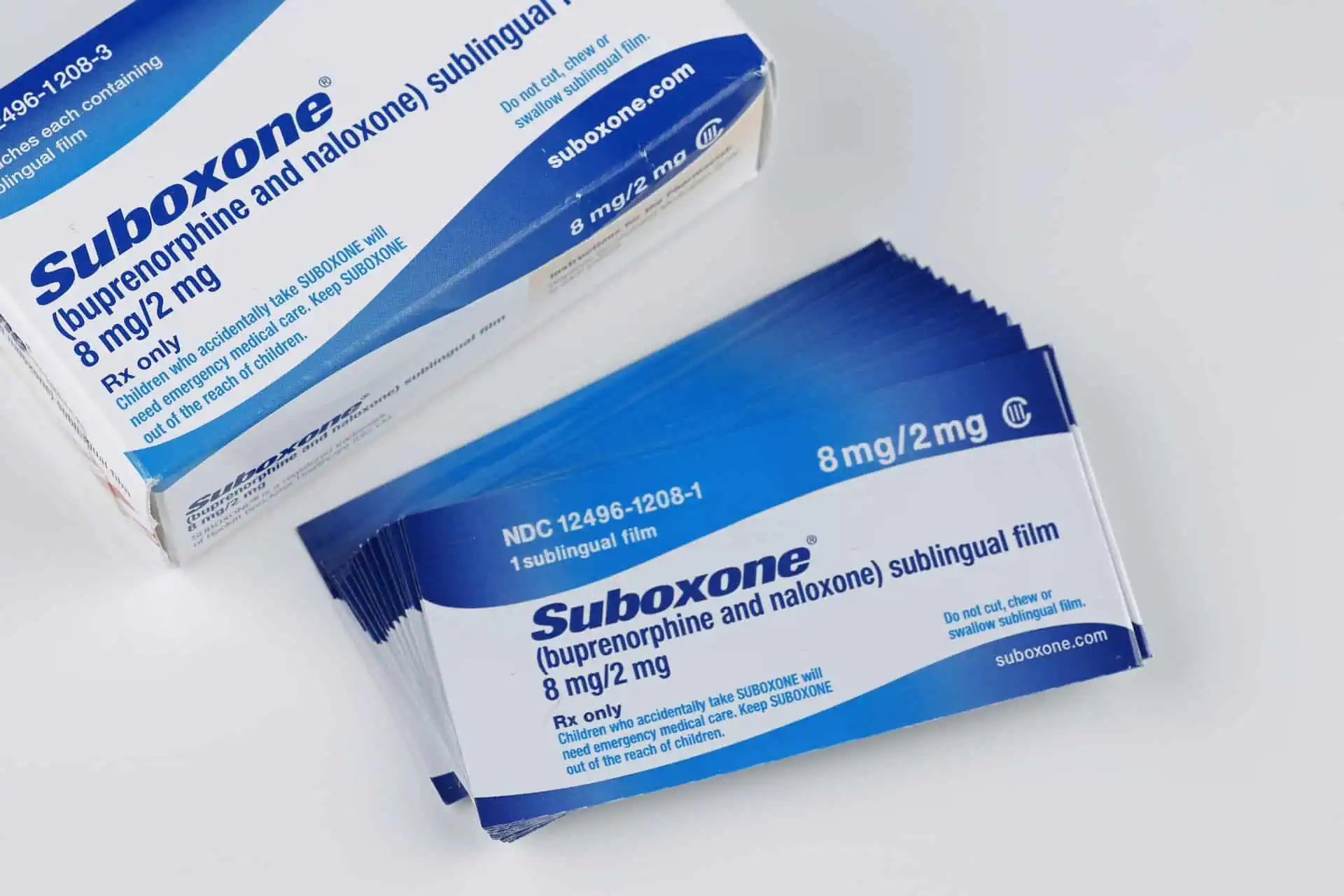FAQ: Is Suboxone Bad for Your Teeth?
- Last Updated: June 12th, 2025

Attorney Jessica Paluch-Hoerman, founder of TruLaw, has over 28 years of experience as a personal injury and mass tort attorney, and previously worked as an international tax attorney at Deloitte. Jessie collaborates with attorneys nationwide — enabling her to share reliable, up-to-date legal information with our readers.
Legally Reviewed
This article has been written and reviewed for legal accuracy and clarity by the team of writers and legal experts at TruLaw and is as accurate as possible. This content should not be taken as legal advice from an attorney. If you would like to learn more about our owner and experienced injury lawyer, Jessie Paluch, you can do so here.
Fact-Checked
TruLaw does everything possible to make sure the information in this article is up to date and accurate. If you need specific legal advice about your case, contact us by using the chat on the bottom of this page. This article should not be taken as advice from an attorney.
Key takeaways:
- Suboxone is a medication frequently used in the treatment of opioid addiction to reduce withdrawal symptoms and curb cravings.
- As patients place Suboxone under the tongue or inside the cheek, the exposure to the drug happens directly in the oral cavity
- Issues such as tooth decay and other dental problems have been associated with the use of Suboxone creating a link between the medication and oral health.
FAQ: Is Suboxone Bad for Your Teeth?
On this page, we’ll answer the question, “Is Suboxone bad for your teeth?” to provide an overview of the common dental issues associated with Suboxone, clinical perspectives on Suboxone, and much more.

Answering The Question: Is Suboxone Bad For Your Teeth?
Yes, Suboxone can potentially cause tooth decay and other dental health issues as it dissolves under the tongue or against the cheek.
The use of Suboxone sublingual strips may cause oral health issues, such as:
- Acidity Levels: The drug’s sublingual formula is highly acidic and can cause dental problems such as tooth decay, tooth erosion, and tooth loss
- Enamel Erosion: The acidity of Suboxone can erode tooth enamel over time, making teeth more vulnerable to decay and sensitivity
- Accelerated Decay: Suboxone’s acidic nature can accelerate tooth decay, especially if oral hygiene is neglected while using the medication
- Other Dental: Dry mouth and changes in oral bacteria from Suboxone use may also contribute to gum disease, oral thrush, and other dental problems
If you’ve suffered from dental health issues after Suboxone treatment, you may qualify to file in the Suboxone Tooth Decay MDL.
Contact TruLaw for a free consultation using the chat on this page to receive an instant case evaluation.
Table of Contents
Common Dental Issues Associated with Suboxone
Prescription medication Suboxone, commonly used to treat opioid addiction, has been linked to several dental health issues.
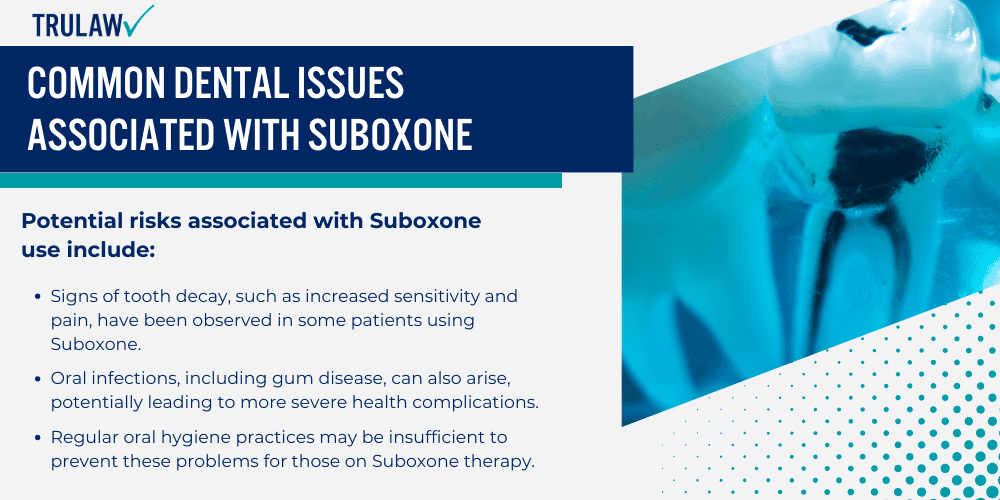
Patients utilizing Suboxone, particularly those dissolving the medication in their mouths, need to be aware of potential oral health risks.
Tooth Decay and Oral Infections
Reports have surfaced connecting Suboxone to cases of tooth decay and oral infections.
These conditions can result from extended exposure to the medication when dissolved in the oral cavity.
Potential risks associated with Suboxone use include:
- Signs of tooth decay, such as increased sensitivity and pain, have been observed in some patients using Suboxone.
- Oral infections, including gum disease, can also arise, potentially leading to more severe health complications.
- Regular oral hygiene practices may be insufficient to prevent these problems for those on Suboxone therapy.
- Dental check-ups are critical for detecting and addressing any such issues early.
Suboxone Tooth Decay Lawsuit and Adverse Events
Suboxone-related dental problems have led to suboxone lawsuits and the recording of adverse events.
It is crucial for patients to understand their legal rights and for healthcare providers to report any issues encountered.
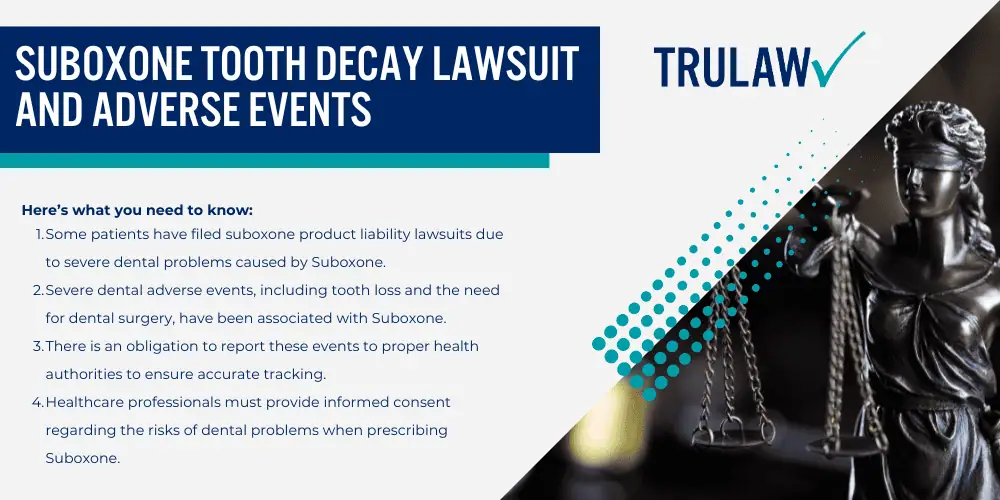
Here’s what you need to know:
- Some patients have filed suboxone product liability lawsuits due to severe dental problems caused by Suboxone.
- Severe dental adverse events, including tooth loss and the need for dental surgery, have been associated with Suboxone.
- There is an obligation to report these events to proper health authorities to ensure accurate tracking.
- Healthcare professionals must provide informed consent regarding the risks of dental problems when prescribing Suboxone.
Clinical Perspectives on Suboxone and Oral Health
Suboxone, primarily containing buprenorphine, is used to treat opioid use disorder but its impact on oral health requires attention, specifically when dissolved in the mouth as recommended for administration.
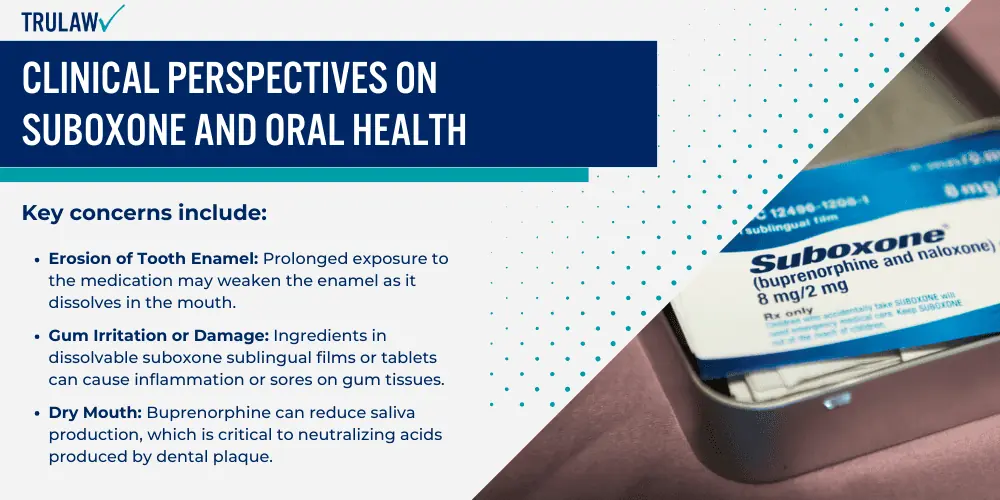
Dental Health Risks of Dissolvable Buprenorphine Medicines
Dissolvable forms of buprenorphine present specific risks to dental health due to direct exposure to teeth and gums.
Key concerns include:
- Erosion of Tooth Enamel: Prolonged exposure to the medication may weaken the enamel as it dissolves in the mouth.
- Gum Irritation or Damage: Ingredients in dissolvable suboxone sublingual films or tablets can cause inflammation or sores on gum tissues.
- Dry Mouth: Buprenorphine can reduce saliva production, which is critical to neutralizing acids produced by dental plaque.
- Increased Risk of Cavities: The reduced saliva coupled with sugary medication formulations can lead to tooth decay.
Patients taking Suboxone should be aware that these dental issues can occur, and maintaining regular dentist visits is essential for preventing serious problems.
Health Care Professional Insights on Suboxone
Healthcare professionals emphasize the necessity for patients on Suboxone to receive regular dental care services.
They advocate:
- Routine Dental Check-Ups: At least twice a year to catch early signs of dental problems.
- Open Communication: Patients should inform their dentist of their Suboxone medication.
- Oral Hygiene Education: Learning proper brushing and flossing techniques to minimize risks.
- Collaborative Care: Periodic consultations between health care providers and dentists can help in managing the patient’s overall health.
Healthcare professionals also urge the importance of considering oral health as an integral part of treating opioid use disorder with medicines like Suboxone.
Managing Dental Health during Opioid Addiction Treatment
Dental health is paramount during opioid addiction treatment as it can be adversely affected by medications used in the process.
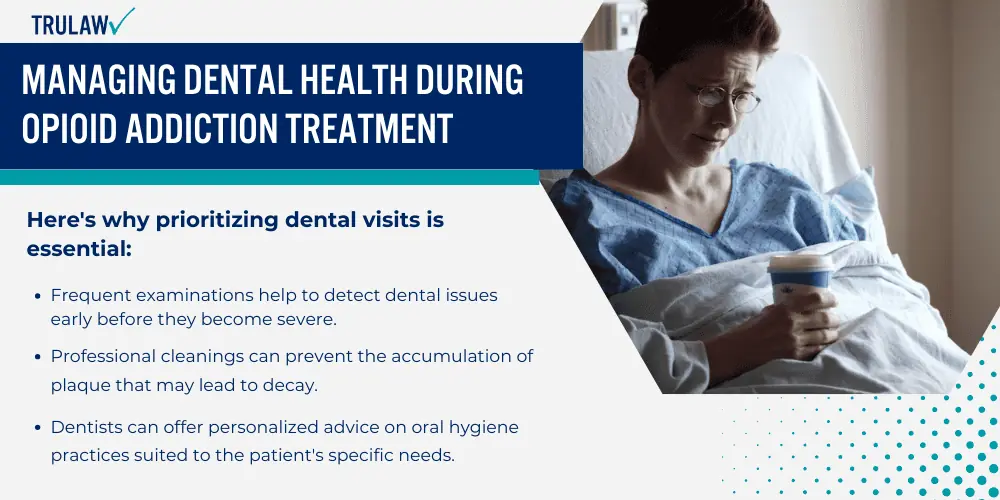
Focus on prevention and coordination between dental and addiction care professionals is crucial to mitigating oral health risks.
Importance of Regular Dental Checkups
Regular dental checkups are a critical component of oral healthcare for individuals undergoing treatment for opioid misuse.
Here’s why prioritizing dental visits is essential:
- Frequent examinations help to detect dental issues early before they become severe.
- Professional cleanings can prevent the accumulation of plaque that may lead to decay.
- Dentists can offer personalized advice on oral hygiene practices suited to the patient’s specific needs.
- Regular visits enable the monitoring of any changes that may occur due to opioid use or medication.
Integrating Dental and Addiction Care Practices
Integrating dental and addiction care practices ensures a more holistic patient well-being approach.
Effective coordination encompasses:
- Addiction care providers should inform dentists about the patient’s opioid treatment to adapt dental care accordingly.
- Dentists should be aware of the side effects of addiction treatments that affect oral health.
- Sharing of patient health records between providers allows for better-informed treatment plans.
- Both sets of professionals should engage in behavioral therapies to address any anxiety related to dental procedures.
Treatment Approaches and Pain Management
Addressing oral health issues in the context of opioid addiction treatment requires tailored treatment approaches and pain management strategies.
Managing dental pain for these patients involves:
- Use of non-opioid analgesics and anti-inflammatory drugs to manage dental pain.
- Employing minimally invasive dental procedures when possible.
- Considering alternative pain management techniques such as meditation or acupuncture.
- Planned with the patient to manage acute dental pain episodes.
Adhering to these specific measures helps patients maintain oral health without compromising their recovery from opioid addiction.
Consumer Information: Is Suboxone Bad For Your Teeth?
Patients considering or currently undergoing treatment with Suboxone should be informed about potential dental risks.
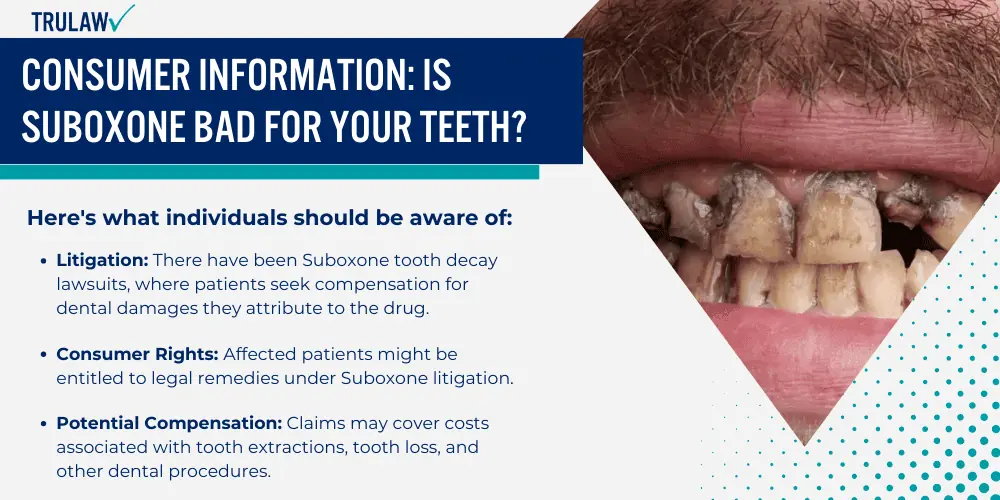
It is important to scrutinize the implications of this medication on oral health, including potential tooth decay and necessary dental surgery.
Suboxone Litigation and Consumer Rights
Patients have reported dental issues after using Suboxone, prompting legal actions in some cases.
Here’s what individuals should be aware of:
- Litigation: There have been Suboxone tooth decay lawsuits, where patients seek compensation for dental damages they attribute to the drug.
- Consumer Rights: Affected patients might be entitled to legal remedies under Suboxone litigation.
- Potential Compensation: Claims may cover costs associated with tooth extractions, tooth loss, and other dental procedures.
- False Claims Act: Some suboxone class action lawsuits, like the False Claims Act, allege improper marketing or undisclosed side effects.
What Patients Should Know About Suboxone and Dental Risks
There are specific dental risks patients should be aware of when taking Suboxone.
They should consider the following:
- Adverse Events: Reports include cases where users experienced poor dental health.
- Mouth Dissolvable Forms: These forms of Suboxone have been linked with dental problems.
- Preventative Care: Patients are advised to maintain excellent oral hygiene and have regular dental check-ups.
- Professional Guidance: Consult a healthcare provider for personalized advice on managing risks and potential adverse events related to Suboxone.
Suboxone Lawsuit Frequently Asked Questions
-
What are the dental side effects associated with Suboxone use?
Suboxone, used for opioid dependence, has been linked to various dental side effects.
Information regarding these dental side effects is vital for patients receiving Suboxone treatment and their healthcare providers.
-
How might buprenorphine contribute to oral health problems?
Buprenorphine can dry out the mouth, reducing saliva flow.
Saliva helps wash away food particles and neutralize acids in the mouth, which can lead to cavities and other dental problems.
-
Are there legal actions related to tooth decay caused by Suboxone?
There have been reported cases where patients have taken legal actions because of tooth decay allegedly caused by Suboxone.
These legal actions have contributed to a broader discussion about medication side effects and patient awareness.
-
What precautions can be taken to protect teeth when using Suboxone?
Suboxone can dry out the mouth, reducing saliva production, which can lead to cavities.
Additionally, sugary foods may increase while using Suboxone, further increasing the risk of tooth decay.
-
Is there a correlation between Suboxone use and increased dental caries?
Studies and patient reports suggest a potential correlation between Suboxone use and a heightened incidence of dental caries.
These insights have prompted healthcare professionals to monitor the oral health of their patients on Suboxone closely.
-
How should oral hygiene be managed for patients on Suboxone therapy?
Proper oral hygiene is crucial for patients undergoing Suboxone therapy.
These oral hygiene measures are foundational to maintaining the health of the teeth and gums for those on Suboxone therapy.

Managing Attorney & Owner
With over 25 years of legal experience, Jessica Paluch-Hoerman is an Illinois lawyer, a CPA, and a mother of three. She spent the first decade of her career working as an international tax attorney at Deloitte.
In 2009, Jessie co-founded her own law firm with her husband – which has scaled to over 30 employees since its conception.
In 2016, Jessie founded TruLaw, which allows her to collaborate with attorneys and legal experts across the United States on a daily basis. This hypervaluable network of experts is what enables her to share the most reliable, accurate, and up-to-date legal information with our readers!
Additional Suboxone Lawsuit resources on our website:
Here, at TruLaw, we’re committed to helping victims get the justice they deserve.
Alongside our partner law firms, we have successfully collected over $3 Billion in verdicts and settlements on behalf of injured individuals.
Would you like our help?
At TruLaw, we fiercely combat corporations that endanger individuals’ well-being. If you’ve suffered injuries and believe these well-funded entities should be held accountable, we’re here for you.
With TruLaw, you gain access to successful and seasoned lawyers who maximize your chances of success. Our lawyers invest in you—they do not receive a dime until your lawsuit reaches a successful resolution!
AFFF Lawsuit claims are being filed against manufacturers of aqueous film-forming foam (AFFF), commonly used in firefighting.
Claims allege that companies such as 3M, DuPont, and Tyco Fire Products failed to adequately warn users about the potential dangers of AFFF exposure — including increased risks of various cancers and diseases.
Depo Provera Lawsuit claims are being filed by individuals who allege they developed meningioma (a type of brain tumor) after receiving Depo-Provera birth control injections.
A 2024 study found that women using Depo-Provera for at least 1 year are five times more likely to develop meningioma brain tumors compared to those not using the drug.
Suboxone Tooth Decay Lawsuit claims are being filed against Indivior, the manufacturer of Suboxone, a medication used to treat opioid addiction.
Claims allege that Indivior failed to adequately warn users about the potential dangers of severe tooth decay and dental injuries associated with Suboxone’s sublingual film version.
Social Media Harm Lawsuits are being filed against social media companies for allegedly causing mental health issues in children and teens.
Claims allege that companies like Meta, Google, ByteDance, and Snap designed addictive platforms that led to anxiety, depression, and other mental health issues without adequately warning users or parents.
Transvaginal Mesh Lawsuits are being filed against manufacturers of transvaginal mesh products used to treat pelvic organ prolapse (POP) and stress urinary incontinence (SUI).
Claims allege that companies like Ethicon, C.R. Bard, and Boston Scientific failed to adequately warn about potential dangers — including erosion, pain, and infection.
Bair Hugger Warming Blanket Lawsuits involve claims against 3M — alleging their surgical warming blankets caused severe infections and complications (particularly in hip and knee replacement surgeries).
Plaintiffs claim 3M failed to warn about potential risks — despite knowing about increased risk of deep joint infections since 2011.
Baby Formula NEC Lawsuit claims are being filed against manufacturers of cow’s milk-based baby formula products.
Claims allege that companies like Abbott Laboratories (Similac) and Mead Johnson & Company (Enfamil) failed to warn about the increased risk of necrotizing enterocolitis (NEC) in premature infants.
Here, at TruLaw, we’re committed to helping victims get the justice they deserve.
Alongside our partner law firms, we have successfully collected over $3 Billion in verdicts and settlements on behalf of injured individuals.
Would you like our help?
